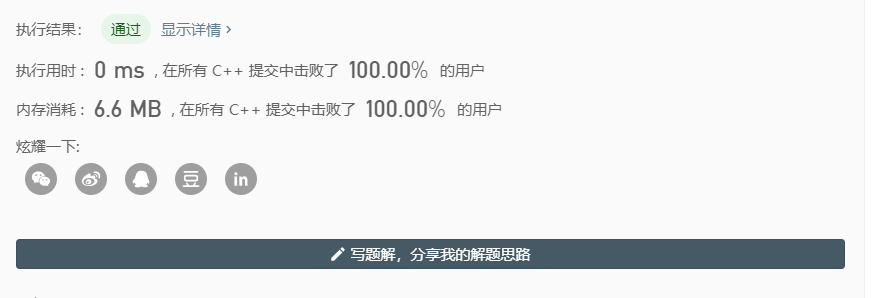地址 https://leetcode-cn.com/problems/decode-string/
给定一个经过编码的字符串,返回它解码后的字符串。 编码规则为: k[encoded_string],表示其中方括号内部的 encoded_string 正好重复 k 次。注意 k 保证为正整数。 你可以认为输入字符串总是有效的;输入字符串中没有额外的空格,且输入的方括号总是符合格式要求的。 此外,你可以认为原始数据不包含数字,所有的数字只表示重复的次数 k ,例如不会出现像 3a 或 2[4] 的输入。 示例: s = "3[a]2[bc]", 返回 "aaabcbc". s = "3[a2[c]]", 返回 "accaccacc". s = "2[abc]3[cd]ef", 返回 "abcabccdcdcdef".
解答
分析问题存在的输入类型 简化问题。输入类型有两种
一种是 数字开头[.....]
一种是 字母开头
"[ ...]" 中的内容其实还是以上两种输入类型 所以使用递归函数解决。
代码如下
class Solution { public: string DeInner(const string& s, int& idx) { if (isdigit(s[idx])) { //得到数字 int start = idx; while (isdigit(s[idx])) { idx++; } int loop = atoi(s.substr(start, idx - start).c_str()); string loopStr = DeInner(s, idx); string ret; for (int i = 0; i < loop; i++) { ret += loopStr; } return ret; } else if (isalpha(s[idx]) ) { //得到字符串 int start = idx; while (isalpha(s[idx])) { idx++; } string ret = s.substr(start, idx - start); while (idx < s.size()) { ret += DeInner(s, idx); } return ret; } else if (s[idx] == '[') { //计算整个[ ]里的字符串 int start = idx + 1; int end = start; int count = 1; while (count != 0) { end++; if (s[end] == '[') count++; else if (s[end] == ']') count--; } string innerStr = s.substr(start, end - start); int tmp = 0; string ret = DeInner(innerStr, tmp); while (tmp < innerStr.size()) { ret += DeInner(innerStr, tmp); } idx = end+1 ; return ret; } return ""; } string decodeString(string s) { int idx = 0; string ans; while(idx < s.size()){ ans += DeInner(s, idx); } return ans; } };
居然还能双100


